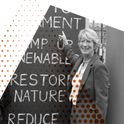Ten years ago, governments around the world prepared to attend COP21. It turned out to be the most consequential UN climate summit to date, setting tangible temperature targets and introducing most of the world to the concept of net zero. Ten years later—and as the same nations prepare for COP30 in Belém, Brazil—some of the shine has come off the Paris agreement. Temperatures are rising faster than hoped and the net zero consensus that emerged following Paris is fracturing. Against this backdrop, Emma Pinchbeck, chief executive of the Climate Change Committee, speaks to Policy Insights about the independent body's role in supporting government to achieve climate goals.
What is the role of the Climate Change Committee?
We’re a politically neutral, independent expert body and we’re here to help policymakers use evidence to make the best possible decisions for the UK in terms of reducing our emissions and then adapting the economy to climate change impacts. We’ve got two different committees, staffed with scientists, technologists, researchers and other experts. One is for mitigation—the technical term for reducing emissions—and one for adaptation which is about making the economy resilient.
In practical terms, what does the CCC do?
We have two big statutory jobs. Every five years we give the government advice on carbon budget levels. Rather than setting specific targets for, say, onshore or offshore wind, the UK has a long-term target to meet our Paris agreement commitment, net zero by 2050. We’ve just advised for 2038 to 2042. By around 2040, we’re looking for an 87 per cent reduction in emissions compared to 1990 levels. We’ve put together a pathway that shows how we might get there but ultimately the government can take that advice or it can develop its own delivery plan. And we do something similar for adaptation. We advise on climate risk every five years.
The CCC combines advice on carbon budgets and emissions targets and, at the same time, acts as an auditor of progress. Isn’t that quite an unusual combination?
If we were auditing our own homework, maybe, but that’s not how it works. The advice is given to a government that accepts it or not, and then parliament legislates. The point of the technical advice is to give parliament and government—away from the day-to-day politics—the best possible, most economically savvy, least socially disruptive emissions reduction number for the UK.
We advise quite strongly where we think the government should pick winners when the technology is well developed, such as electric cars for example. But there’s a lot of optionality and agnosticism that we put into the models for technologies that are still developing or where we think there’s a large amount of choice. We don’t do social policy or industrial strategy.
Nonetheless, the advice you lay out is highly detailed. Is that a fair characterisation?
The advice tends not to be policy-focused. For example, we say that electricity needs to be cheaper. That’s a primary CCC recommendation. We make a suggestion to move electricity bill levies, for example, but we don’t say the government should move them to general taxation, put them on gas bills or move them somewhere else.
Regardless of what they call it, almost every political party is going to get involved in this energy transition one way or another
To be clear, when you recommend cheaper electricity, you are answering the ‘why’ but not the ‘how’.
That’s right. We’ve modelled a couple of options so the government can see the economic outcome of a 20 per cent reduction in electricity costs, for example. We’ll present something that shows feasibility but we don’t take a view on which option is better.
Is it frustrating that you’re not allowed, in most circumstances, to present a favoured solution?
No. Our value is our independence. Our value is the medium to long-term view. Our value is our scientific expertise, which has a different cadence to policymaking.
Is there a danger that mitigation and adaptation—two areas of focus for the CCC—work against each other? Does adaptation give nations a pass on mitigation?
I’ve been involved in climate for a long time, and certainly at the start of my career there was a view that if you advocated for adaptation then there was a risk that governments would think that was a solution that meant they didn’t necessarily have to do mitigation as well. To be clear, it’s both, not either. If you don’t mitigate collectively and globally, then the adaptation problem gets worse and/or unmanageable. That’s the value in having both committees. We bring them together a couple of times a year to look at shared issues.
Adaptation is the Cinderella of climate change in this country. That’s not the case in other parts of the world. Of the 26 other climate change committees internationally, many—particularly in the global South—put greater focus on adaptation because the impacts are present already.
To what extent does your committee play a role in the run-up and during COP meetings?
We go when we’ve got a job to do. We went last year to COP29 in Azerbaijan because we were introducing the new nationally determined contributions (NDCs) for 2030. We were asked in for the technical advice. Our role is to be supportive of whatever the UK is doing.
It is genuinely hard to understate how respected the Climate Change Committee is as an independent body and also the way the carbon budgets have worked in the UK. We have had real emissions reduction in the UK in periods of economic growth and were the first place on Earth to demonstrate that you could produce emissions reduction and economic growth at the same time. We’ve built major industries here like offshore wind. We’ve done it with market instruments, we’ve done it across successive governments. That model—the consistency of it, the fact it gives really strong investment signals and it’s not prescriptive—is being copied in other countries.
To what extent does geopolitics play a role in your decision making?
If there’s been a massive event that’s slowed down climate change action—the energy crisis, for example, or redirecting funds for defence—we’d reflect that in our audit advice somewhere. These are things that maybe are not in our remit, but I would imagine the committee would consider them when they’re evaluating government progress. Global supply chain crunches, energy price crunches—that sort of commodity risk is factored into the analysis. And if you look at the Seventh Carbon Budget advice, there’s a whole chapter on uncertainties and on fuel supply and imports. We do take a view there. But because the advice we give is medium to long term, some geopolitical events are not going to significantly affect decarbonisation in the long run. Our job is to work out when they start to affect the feasibility of delivery.
What about the changing politics of climate change, notably the growing noise and scepticism around net zero?
The economics are only going in one direction on energy. Most countries are doubling down on domestic electrification because it’s cheaper and because it’s making them less dependent on imports. This is an industrial revolution happening at scale. It’s not a net zero transition. It is an energy transition. So regardless of what they call it, almost every political party is going to get involved in this transition one way or another.












